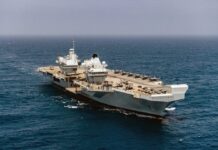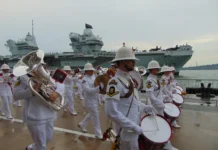
Professor Eric Grove (1948-2021). Obituary by James Goldrick
Eric Grove was born in Bolton in Lancashire and brought up in Aberdeen, attending Aberdeen Grammar School and graduating with an MA from the University of Aberdeen. After completing an MA in War Studies at King’s College London, he was appointed a lecturer at Britannia Royal Naval College (BRNC) Dartmouth in 1971. Apart from a year’s very enjoyable attachment to the United States Naval Academy at Annapolis, Eric remained at BRNC for nearly 14 years, becoming the Deputy Head of Strategic Studies.
Although in many ways the bearded, tweed-jacketed, bow-tie-wearing lecturer with socialist opinions represented the stereotype, verging on caricature, of an academic in most naval eyes, Eric very quickly became a mainstay of the college’s academic programmes.
At first only a few years older than most of his students and younger than some, Eric had a peculiarly British – his Scottish upbringing caused him to reject any label of English – combination of energy, enthusiasm, and eccentricity. This was supported by a keen intellect and a remarkable memory for an extraordinary array of subjects. Officers in his seminars at BRNC were astonished by his ability to remember exactly where a relevant book was located within the volumes stacked three deep and six feet high around his office walls. Eric brought such mastery of detail to everything he did, whether it related to trams, tanks, railway engines, fast cars, navies, or church music (he was an accomplished counter tenor). But Eric rarely allowed temporary concentration on detail to interfere with his mastery of the big picture. His ability to deliver a coherent and enthralling lecture without a formal script was legendary. Eric could even keep junior officers awake in BRNC’s famously soporific Caspar John Hall, a feat achieved by few others.
For his part and to his own life-long astonishment, Eric soon developed a devotion to the Royal Navy that would be manifest in almost every aspect of his subsequent career. This devotion never amounted to capture. Eric was always one of the Royal Navy’s most intelligent critics, perhaps because his own background made him acutely aware of the RN’s challenges in evolving to meet the needs of a United Kingdom that itself was undergoing profound political, social, and economic change. When he arrived at BRNC, the Navy had yet to fully abandon many of its own distinctions of class. Eric early recognised that the RN was struggling in this and other ways to reconcile a poorly understood and largely mythical past with a difficult present and an uncertain future. It is not an exaggeration to say that he spent the rest of his life trying to help the RN – and other navies – find their way.
Eric never lost his left-wing convictions, and he was particularly impatient with British Conservative governments which, in failing to resource the Royal Navy properly, failed to meet not only (in his eyes) the one possible justification for their election, but a requirement that was supposedly central to their own political ethos. His reaction to the 2015 Strategic Defence Review was especially caustic, but he had been an acute critic of the Thatcher era, notwithstanding any admiration for the prime minister’s performance during the Falklands’ conflict. He became, after what he viewed as a good start with the 1998 Strategic Defence Review and its aircraft carrier project, highly critical of the Blair and Brown Labour governments’ increasing divergence between their rhetoric and an actual commitment to maritime security.
After leaving Dartmouth, Eric continued to be involved in many naval activities, lecturing at Greenwich and other institutions, and becoming a welcome speaker at mess dinners, particularly Trafalgar nights. He was a co-author of the 1995 revived BR 1806, previously the Naval War Manual, but now entitled British Maritime Doctrine. He continued to be consulted in later years, although he felt that the Royal Navy was becoming increasingly confined within a Joint construct that reflected the needs and the outlook of the British Army much more than it did the other Services or Britain’s’ real strategic challenges. The first decade of the twenty first century with the distractions of the Middle East conflicts was a period of particular anxiety for him as he saw funds leached from the RN to support commitments on land that had been under-resourced in the first place.
Eric also made many contributions to the Royal Australian Navy, both in historical and policy work. He spoke at the first Australian Naval History Seminar in 1989 on RN-RAN relations in the 1950s. In 1995, Eric delivered that year’s Vernon Parker Oration to the Australian Naval Institute. In 1997, Eric had a very happy year as a visiting fellow at what is now the Australian National Centre for Ocean Resources and Security at the University of Wollongong, an attachment organised by his friend Sam Bateman. In 2000, Eric reviewed the draft of the first edition of Australian Maritime Doctrine and contributed some important suggestions. He made repeated visits to Australia to speak at the RAN’s Sea Power and Naval History conferences , his last attendance being in 2013. Eric also made many visits to other countries and other navies. He was, for example a regular presence in South Africa where he was a very highly regarded visiting lecturer at the SA Naval Staff College in Cape Town.
It was significant that Eric’s doctorate of philosophy from the University of Hull was not gained through the successful defence of a dissertation but from assessment of the quality and breadth of his body of published work. He never stopped producing in an academic career that spanned fifty years and his mastery of the history of navies was only matched by his grasp of their contemporary and emerging challenges. Perhaps his most important work was Vanguard to Trident: British Naval Policy since World War Two. Well written and comprehensively researched, this 1987 book remains the most authoritative analysis of the RN in the three decades after the end of the Second World War. In recent years, Eric was urged to bring it up to date, but there were always too many other projects to complete first. Eric gained great satisfaction in particular from his work with the marine archaeologist Innes McCartney, a high point of which was the search for the lost battleship HMS Audacious and the TV program which resulted. As a ‘talking head’, Eric became a mainstay of naval history programs and newscasts, electronic transmission doing little to diminish his ability to engage an audience.
Eric’s later academic career was, to say the least, varied but he made important contributions to several institutions, including the Universities of Hull and Salford. In the early 1990s, he was one of the key movers in setting up the regular talks that became the Russian/United Kingdom/United States naval dialogues. Eric always felt, on a greater scale, that the later evolution of the new Russia into an authoritarian state was in part the result of the failure of the West to help manage the transition from the old USSR.
Eric’s first marriage to Elizabeth Stocks was dissolved in 2005. He then married the opera singer Sarian Grevelle but she died in 2016. The following year Eric married Swee Poh Kanagasabay, whom he met shortly after Sarian’s passing. They were both very happy in Blackpool, where Eric lived after his retirement from full time academic work.
Since Eric’s death, aged 72, social media has been full of personal recollections which have been consistent not only in their description of a larger-than-life character and a remarkable intellect, but of his personal warmth, generosity, and desire to help anyone who asked. His legacy will remain not only in his published work and recorded media but in the many academics and naval people around the globe who benefited from his learning and his kindness, as well as his influence, however subliminal, on the future progress of western maritime strategy and naval development.



